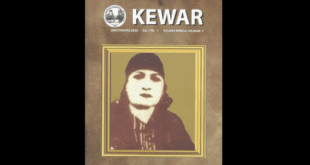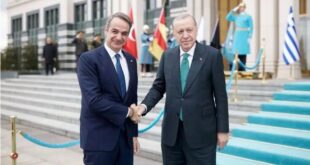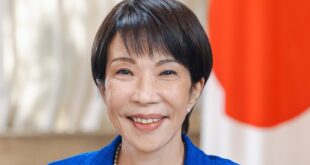Interview: Necat Ayaz
As I went deeper into the history of Kurds, I discovered that women had always played an integral part role in the struggle. Despite the sociological realities of Kurdish society, many women have been actively engaged in the struggle for a long time.
The role of women in the struggle of the Kurdish people has attracted attention from around the world. Nelly Jazra, a Lebanese writer has shown interest in this topic and published an article about the Kurdish women’s struggle, which was later included in a book in Belgium. In honor of International Women’s Day, we spoke with her about the role of Kurdish women in Rojava. Additionally, she shared her thoughts on the potential recognition of Rojava in a future Syria and future of Lebanon, her birthplace.
What sparked your interest in the struggles of women in Rojava that led you to write an article about it?
My main focus was on the women who were actively fighting, particularly the Kurdish women who had been engaged in the struggle for a long time. I found it fascinating that ISIS members were particularly fearful of being killed by a women, as their beliefs dictated that being killed by a woman prevent them from entering paradise. As I went deeper into the history of Kurds, I discovered that women had always played an integral part role in the struggle. Despite the sociological realities of Kurdish society, many women have been actively engaged in the struggle for a long time.

Apart from their military integration into the struggle and their heroic resistance, what is your opinion on the role of women in the societal model of Rojava?
Previously, women`s role in society were limited to being in the home, at the kitchen and taking care of children. However, now women are visible in public spaces.This visibility nor only adds a military aspect but also political one. Women who have been fighting, are also participating in decision making processes, leading to their empowerment. This shift is significant as it challenges partriarchal norms within society.
Given the empowerment of Kurdish women, do you think that the Rojava Revolution has the potential to impact the the Middle East, especially on Arabic peoples?
I believe there is insufficient awareness of the situation in Rojava. While there is extensive news coverage of the Kurds, there is a lack of focus on the women’s struggle. The women’s movement in the Middle East has a long history, with actively engaging in politics. Unfortunately, this tradition of struggle has not been connected to the Kurdish struggle, and they have remained separate. This is unfortunate.
What do you suggest to create a common struggle between Kurds and other people in the region?
There should be more exchanges and joint committees that include represantatives from all sides. I am not just talking about the grassroots level, but also at an international level with a regional focus. Whenever there is an event at this level, Turkish women always participate. It is essential for Kurdish women to participate as well.
I would like to ask a question about the situation of Rojava. There have been discussions about whether federalism, autonomy or continuing with unitary model that was in place during Assad era is the best solution for Rojava. What is your opinion on these discussions?
I believe that there should be a certain level of autonomy for the Kurds. I do not think that federalism will work in Syria as there is no history of federalism in the country. However, providing autonomy for he Kurdish region while respecting their language, traditions, and ethnic identity could be a viable solution. In order to do this, the authority of Rojava must also be respected.

I have a question about Lebanon. With the last war Hezbolah was weakened by Israel and a new president was elected. Do you have hope for the future of Lebanon?
Now there is much more optimism in Lebanon. An end to war and a cease fire brought relief to the people. The war was very terrifible backed by the USA. People in Lebanon have lived through many wars but the last one was particularly awful. At the end of the war Hezbollah was militarily weakened but they remained politically active due to the power granted them by Lebanon’s political model. I hope that Lebanon will have a better future after emerging from destruction of the war
Do you believe that the power sharing model based on a quota system between different religious groups will continue to function effectively in post-war Lebanon?
I think this should not be the choice for the moment. As women, we defend secularism for Lebanon. To me, it will take a lot of time to move away from this confessional model. Confessionalism was imposed by colonialism. The French preferred this model because it divides and controls. This is the colonialist model. When you give power to religious authority, it is much more difficult to take back that authority. Due to this, the room for politics is too small in Lebanon. Unfortunatelly, it will take several generations to develop another model.
Cover image: Lebanese writer Nelly Jazra/Photo: Myriam Saneem
To read the interview in Kurdish please click on this link
—————————————
About Nelly Jazra
Nelly Jazra is an european expert on rural and regional developement for Middle East. She is from Lebanon and member of greek ortodox minority. She has a doctorate degree in economics. She works on women’ issues, focusing on countries dominated by exremist regimes. With her 10 years of specific experience in gender equality, her working topic is civil rights and political life in the Arab countries and at the Euro-Mediterranean level. Jazra hosts a program called Femmes Citoyennes on Radio Alma based in Brussels.
Jazra has written these books:
-
Les Combats de Femmes
-
Les Mouvements Sociaux: Liban, Iraq, Algeria
-
Femmes dans les printemps arabes
-
Au pays du cedre
-
Le Clair-Obscur Rue Abdel Wahab Beyrouth
-
Kasaia decouvre
 Infowelat Enformasyon Ji Bo Welat
Infowelat Enformasyon Ji Bo Welat




